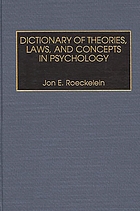 The Dictionary of Psychology
by
Corsini, Raymond J.
The Dictionary of Psychology
by
Corsini, Raymond J.
Call Number: REF BF31 .C72 1999
ISBN: 158391028X
Publication Date: 1999
With more than three times as many defined entries, biographies, illustrations, and appendices than any other dictionary of psychology ever printed in the English language, The Dictionary of Psychology is a landmark resource. The most comprehensive, up-to-date reference of its kind, the Dictionary also maintains a user-friendliness throughout. This combination ensures that it will serve as the definitive work for years to come. With a clear and functional design and written in a highly readable style, the Dictionary offers over 30,000 entries (including interdisciplinary terms and contemporary slang), more than 125 illustrations, as well as extensive cross-referencing of entries.

 Dictionary of Theories, Laws, and Concepts in Psychology
by
Dictionary of Theories, Laws, and Concepts in Psychology
by